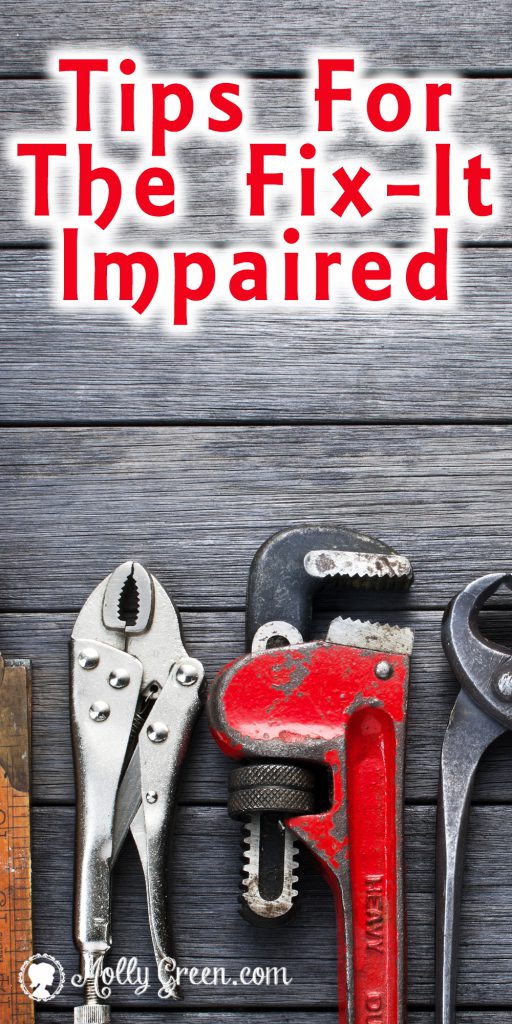By Rhonda Barfield
For the two years my family lived in an 1860s’ mansion, I had many opportunities to observe handymen at work. I found this educational. Though I vaguely recall my father making numerous small repairs around my childhood house, and even tackling some ambitious carpentry, he never showed me the tricks of the trade. My mother and I were supposed to focus on housework, anyway, and leave the fixin’ stuff to the menfolk. So we did.
That’s how I came to be “fix-it impaired.” And that’s why I decided to try and change.
Whenever our handyman, Ken Dixon, came to the house with his tool box, I followed him around as the go-fer. This gave me not only some important insights into how stuff works, but also some ideas of how I could resolve at least some issues on my own, rather than calling a repairman.
Sometimes the problem has nothing to do with fixing.
When our bedroom fan stopped working, for example, I remembered that it had been quite a while since I’d cleaned it. With a closer look, I noticed two pieces of dental floss wrapped tightly around the blades. I snipped them off, vacuumed the blades and motor, and voila! Good as new. 10 minutes of cleaning saved the cost of a new fan.
Our current landlord warned us, when we first moved in, about our kitchen sink. “You’ll get an overflow out of the laundry pipe in the basement,” he said, “if you let any grease go down the drain.” So Michael and I wiped down all our oily cooking pans and even scraped excess grease from plates and platters before we washed them. Six months later, in spite of our best efforts, the drain plugged. That’s when I decided to try an alternative solution. We were still careful about grease, but also started pouring a kettle of boiling water down the kitchen sink every morning. Problem solved. For the past year, we have not had a plugged drain.
My friend Lyn, who helped her husband rehab several houses, recommended this approach toward something that’s broken. As she used to say, “The worst you can do is to break it more.”
That motivated me to try and figure out why our refrigerator kept leaking water onto the floor. I pulled off the grate but couldn’t see any problem. I yanked on the pan underneath– wouldn’t give– yanked again– got it loose. Found a hose that led to the drinking water supply in the door, dripping. Though I didn’t have the skill to fix it, this helped me describe my theory to Ken, who spent less time on the repair and saved my family some money.
Our new house’s dishwasher never worked well. The plates often seemed covered with some kind of film, and the silverware looked greasy. At first I suspected a problem with the appliance. But when a friend suggested adding a cup of vinegar to the wash a couple of times a month, I thought it was worth a try. Now I make this a habit, and both the dishes and the silverware always come out looking clean. Simple maintenance fixed the problem.
Our living room blinds resisted opening and closing when I pulled on the cords. The front door often stuck. The hinges on a closet door creaked, and a kitchen drawer stuck. We found the solution to all of these issues, and many others, when we sprayed on WD-40, the fix-it-impaired’s friend. This stuff works miracles.
My friends Emily and Josh fix most of their cars’ problems by researching the solutions online. You can find help through articles, video tutorials, and a rich variety of other sources. You can even go to an appliance manufacturer’s website and take a look at a particular model’s specs, then order a part yourself. Check availability on eBay before you buy it from the manufacturer.
I’ve found www.doityourself.com helpful because I can log in and post questions on several forums. Some of the answers to posted problems are designed for handymen, but if you mention that you’re a novice when asking a question, you’ll get plenty of suggestions in simple, straightforward language. This helped me when I was trying to diagnose a problem with our washing machine.
Please be careful, especially when dealing with electrical issues.
Follow basic rules, such as unplugging appliances before you work on or clean them, or turning off the power. I once got the shock of my life– literally– when trying to clean a light switch. Shut off the water before you tackle a plumbing issue. Use common sense. Over the years, I’ve learned a lot about the fix-it process, but I’d still describe myself as a novice to the extreme. I don’t mess with the complicated or possibly dangerous jobs, but I’m glad I can try a few simple tasks I can do myself. This makes me feel, sometimes, almost like a real handywoman.
So, what about you? Are you fix-it impaired?
Rhonda Barfield is a professional homemaker, wife to Michael, former homeschool teacher (for 20 years) and mother of Eric (26), Christian (24), Lisa (23) and Mary (20). She’s authored five books: Real-Life Homeschooling: The Stories of 21 Families Who Teach Their Children at Home (Fireside/Simon & Schuster) and four on saving money on groceries, including Feed Your Family for $12 a Day. She has also written more than 80 published articles. In addition, Rhonda coaches writing students for WriteAtHome.com and teaches piano.






